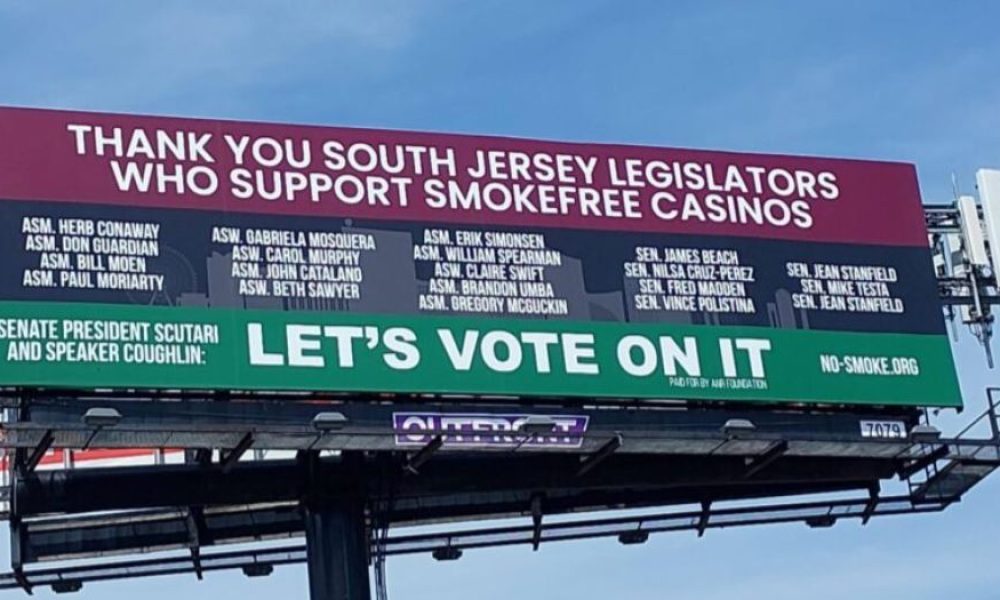Three-fourths of Philadelphia-area residents say they would visit Atlantic City casinos more often if the gaming floors were smoke free, a new survey found.
The research follows pleas by a longtime gaming executive and a noted labor leader for legislators to ban smoking in New Jersey casinos.
A bill to remove the casino exemption from New Jersey’s clean-indoor-air law was scheduled for a vote Thursday in a state Senate committee hearing. But on Wednesday a leading sponsor of the bill said he was pulling the bill from consideration in this session of the legislature, which adjourns at the end of the month.
With a finding that 74 percent of respondents were more likely to visit a casino that is entirely smoke free, the survey released Wednesday shows “tourism could actually increase” with a smoking ban, said Jill Normington, partner at Normington Petts, a Washington, D.C., polling and campaign strategy firm. It conducted the online survey, commissioned by a group of public health nonprofit organizations, from Dec. 5 to 7 among 500 adults in the Philadelphia-media market. The survey has a sampling error of plus or minus 4.4 points.
Bronson Frick, director of advocacy for the Americans Nonsmokers’ Rights Foundation, one of the survey sponsors, said 29 percent of respondents identified as smokers, more than double the national adult smoking rate of 11.5 percent.
“For years, there has been has been this anecdotal myth that visitors from Philadelphia won’t go to Atlantic City if the casinos are smoke free,” he said. “It’s not really a surprise that (smoking’s) not a primary factor for determining where people go. … The support (of a ban) was strong, even among those who do smoke.”
The foundation recently released videos of gaming professionals explaining the effects of being forced to deal with secondhand smoke. One features veteran casino executive and gaming regulator Richard Schuetz, saying industry support of smoking despite the health risks to employees “is just ludicrous.” Other videos feature two veteran Atlantic City dealers active in Casino Employees Against Smoking Effects, explaining the health risks they face and the conditions they encounter, including being unable to even turn away when a player lights up.
“A lot of lawmakers don’t go to casinos, so they’re just don’t know what it’s like,” Frick said.
Separately, United Auto Workers president Shawn Fain, whose organization represents dealers at three Atlantic City casinos, wrote a letter to New Jersey legislators insisting on a total ban of smoking on gaming floors and saying the union will monitor their votes.
More than half the members of each chamber of the legislature are co-sponsoring bills to end the casino exemption to New Jersey’s smoke-free law and Gov. Phil Murphy has promised to sign it if passed. However, it’s not been brought to the floor of either chamber.
Frick said he expects the bill to be approved during the current lame-duck session, despite last-minute attempts by the New Jersey Casino Association to delay or water down the measure, including by allowing indoor smoking rooms.
He said groups representing airlines, restaurants, hotels, and other industries fought proposed smoking bans years ago with similar dire warnings of job losses and reduced earnings. In 2006, Westin Hotels became the first nationwide chain to ban smoking. “They went against the policy position of the American Hotel and Lodging Association,” he said. “At the time, it was unthinkable (to go against) the norm.” The ban reduced costs, increased worker efficiency, and became the standard for operators.
More than 20 states require commercial casinos to be smoke free and many tribal operators have voluntarily banned smoking, as has Parx Casino in Philadelphia, Pennsylvania’s top-grossing operation. “So being smoke free isn’t a problem when operators don’t want it to be a problem,” Frick said
New Jersey would not be the first state to reverse a ban on casino smoking; Illinois, Montana, Delaware, and Colorado have done so. Still, New Jersey’s status as a gaming pioneer would “set a huge precedent” with a smoking ban, Frick said.
“This will be a great step for the gaming industry, because it will show that casinos can abide by basic health-and-safety regulations like any other employer,” he said, in addition to affirming that smoke-free air reduces health-care costs and employee turnover.



